ASTANA – Kazakhstan gears up to commemorate the 310th anniversary of a towering figure in Kazakh history Abylai khan, best known as the ruler who united the 18th-century Kazakh Khanate and liberated its territories from foreign invaders.
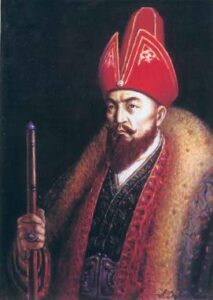
Portrait of Abylai khan. Photo credit: e-history.kz
Abylai khan was known as a courageous warrior and an able diplomat, with a mission to reunite the Kazakh territories balancing between the three great empires: the Russian, the Dzungars, and the Qing Dynasty.
Abylai’s childhood and rise to power
According to Russian annals, Abylai, whose real name is Abilmansour, was born in 1713. He was of noble ancestry – the son of Korkem Uali Sultan, grandson of “Kanisher” (Bloodsucker) Abylai, notorious for his brutality and tyranny, and a descendant of Genghis Khan’s son Jochi.
A historical behemoth such as Abylai’s biography takes on a life of its own. Sometimes records emerge to cast new light on old subjects, yet there are many glimpses in the story of his life that may seem rather taken from a mere folk tale.
One such story is the story of his childhood. Abylai has had a hard childhood, with a greater taste of poverty and hard work than his descent might assume.
When he was 12 years old, his father, Sultan Uali, died in the war with the Dzungars, a confederation of several Oirat tribes in modern-day Mongolia and northwest China. The orphaned boy set off to Turkistan to ask for the protection of his noble relatives. There he herded camels of the famous philosopher and jurist Tole bi and served as a shepherd.
Dressed in rags, skinny and unkempt, his looks were not great then, earning him the nickname Sabalak (shaggy/beggar).
Despite his looks, from the youngest age, Abylai had a reputation for being brave, sharp-witted and smart. He always held himself with great dignity.
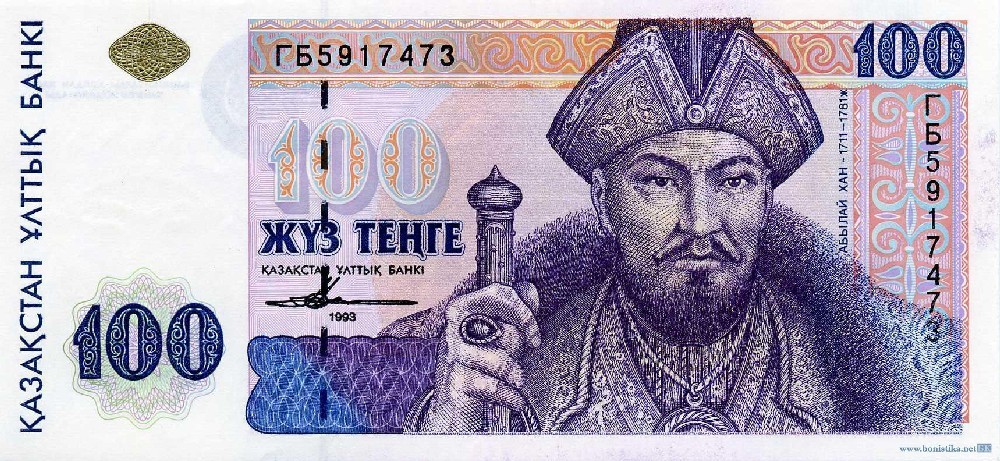
The portrait of Abylai khan was presented on the old version of 100 tenge banknote, which was in circulation until 2006. His image was first depicted by artist Mazhit Aitbayev in 1943, who painted his portrait focusing on the photo of famous Kazakh ethnographer Shokan Ualikhanov – the great-grandson of Abylai. Photo credit: time.kz.
Abylai distinguished himself at the age of 19 by winning a one-on-one battle against Sharysh batyr (hero), the son of Galdan Tseren, who led the Dzungar army against Kazakhs in what went down in history as Anyrakai battle.
Sharysh was described as a mighty man of gigantic height. No one in the Kazakh army dared to fight him until the squire of Bogenbai Batyr, nicknamed Sabalak, rode forward chanting the name of his grandfather “Abylai!”
It is said that Abylai defeating Sharysh in single combat snatched victory for Kazakhs from the jaws of defeat. Its place in history is supported by several accounts of Kazakh zhyraus (folk poets).
Following this event, Abylai re-established his noble ancestry in the army, leaving no doubt that he was the legitimate heir of “Kanisher” Abylai and accepted his grandfather’s name as his own.
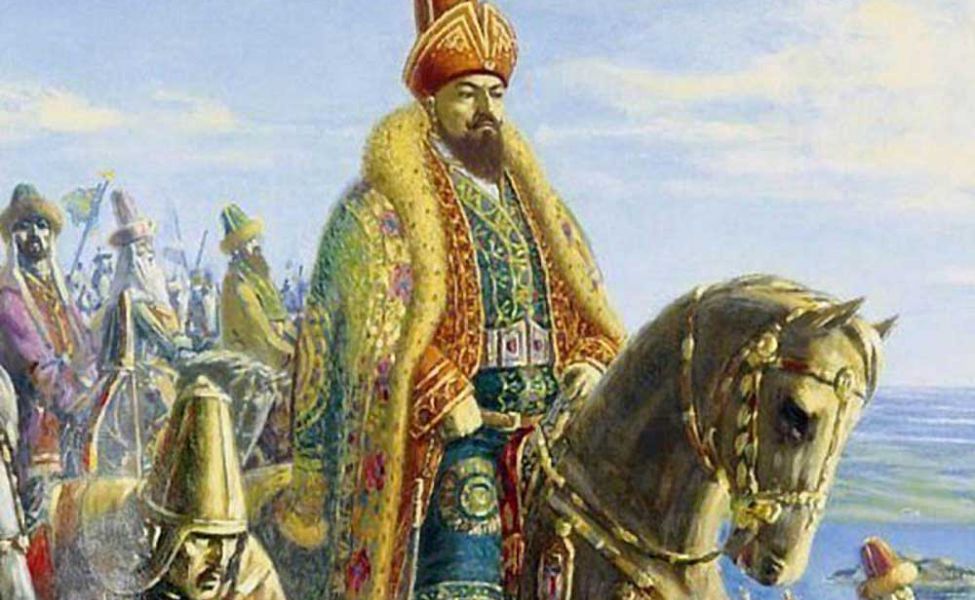
There are many glimpses in Abylaikhan’s life story that may seem rather taken from a mere folk tale. Photo credit: kazgazeta.kz.
His formal career began when he became the military commander of the entire army of the Middle zhuz (one of three alliances of Kazakh nomadic tribes) under Abilmambet khan.
His quick rise to power could be attributed not only to his achievements as a skillful warrior and commander but also to his emerging talents as an orator and a fine diplomat.
Historian Alexey Levshin said that although Abylai was generally known as the sultan, his name was often mentioned along with Abilmambet khan as the ruler of the Middle zhuz in the historical documents.
Abylai held captive in Dzungaria
Given all the myths and tales attached to Abylai khan’s life, the story of a time he was held captive in the hands of Dzungar khan Galdan Tseren in 1742 is the most captivating and evidence-based.
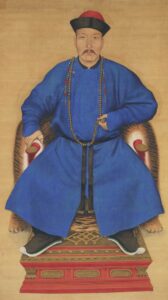
Possible portrait of Galdan Tseren painted by an unknown Qing artist in 18th century. Photo credit: wikipedia.org
The Dzungar invaders were constantly attacked by the Kazakh army under the command of Abylai sultan from 1738 to 1741, and in 1742, he was captured by the Dzungars who attacked from an ambush. The capture of Abylai caused unrest in Kazakh society, and his release became a major political issue.
With authors and historians trying to paint a more balanced picture of Abylai’s release from captivity, two versions of the story prevail. One is that he was released after Galdan Tseren received a letter from the Orenburg governor Neplyuev sent with the Russian ambassador major Muller and the second says that he was released due to skillful negotiations held by the best Kazakh batyrs and biis (judges).
Abylai rejoined his people only after two years of captivity.
Power struggles among Galdan Tseren’s descendants led to the governing groups of Dzungaria losing some of their military might after his death in 1745.
Abylai made every effort to use the throne dispute to return the Kazakh lands adjacent to East Turkistan that were under the temporary rule of the Dzungaria to fully restore the nation’s initial territories.
Abylai as a skillful diplomat
What sets Abylai khan apart from many other rulers is that he understood the strategic importance of what is now called a multivector diplomacy of the Kazakh khanate, clutched in the grip between Russian and Qing empires and under constant attacks of Dzungars.
Therein lies the greatest but often unrecognized achievement of Abylai khan.
He sought a partnership with the Russians against Dzungar invaders. He understood the need for a policy based on mutual benefit. In 1740, he traveled to Orenburg in Russia with Abilmambet khan and 120 officers to enter the guardianship of the Russian government.
As commander of nomad tribes, he extended the hand of friendship and alliance to China’s Qing dynasty, maintaining mutual trade.
He took the pragmatic path of becoming a diplomat between the Kazakh tribes and the Dzungar invaders as well. He accomplished this through skillful diplomacy backed when necessary by the swift and resolute use of military force.
He developed friendships, some out of necessity, but they came to be what preserved the freedom of the Kazakh nation in the midst of three giant states in the 18th century.
Gradually his reputation grew as a trustworthy and firm ruler, devoid of pretense and deceit. These acts are now celebrated as visionary diplomacy and a struggle to maintain peace in the region.
Abylai khan and the Russian Empire
Abylai khan sought peaceful relations with Russia. Exploiting the strengths and weaknesses of the empire, he declared his loyalty to Russia during his trip to Orenburg but refused several consecutive invitations from governors, asking them to visit him instead.
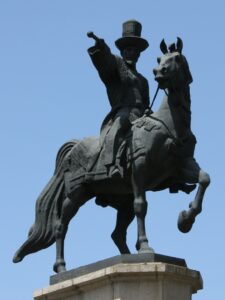
Monument to Abylai Khan in Almaty. Sculptor K. Satybaldin. Photo credit: wikipedia.org
In 1765, he concluded a treaty with Russia but did not accept the tsarist government’s decision to grant him the Great Khan title and did not come to the solemn ceremony where he was to be presented with the act, coat and saber. He considered it beneath his dignity because he was convinced that it was not Russia that elected him a khan but his own people.
Among the 1759-year memories of Count Vorontsov, chancellor of the Empress, Abylai khan is a figure with a strong reputation among Kazakhs.
“Abylai is considered the most important ruler in the entire Middle horde. Besides, he is more intelligent and flexible (dexterous) than others, he should be made a real khan. The local people should not elect a khan without a decree, like the example of Abilmambet khan of the Middle horde. It is very difficult to resist him. Because, according to his deeds, Abylai is called khan everywhere today,” reads his letter to Davydov, Orenburg governor and secret counselor.
As the Kazakh front was uniting, the Russian Empire faced problems controlling its vassals. Despite the fact that Abylai was officially recognized as the khan of the entire Kazakh people, the Russian Empress Catherine II, fearing the increased authority of Abylai, considered him only as the khan of the Middle zhuz.
Abylai tried to eliminate the social and political anarchy that had characterized the divided Kazakh steppe. He understood the need for a policy based on the rule of law. By removing thieves, killers and thugs, he started putting his internal house in order, and he needed Russian military support for that.
Excerpts from his letter written in 1772 to Lieutenant-General Ivan Decolong and to Lieutenant-General and Governor Ivan Rennedorf outline his intentions with the Russian empire.
“Mister General, let me tell you that our Horde is not like your Russia, it is very scattered. It is not possible to find and catch thieves and miscreants quickly. Our land is very big. That is why it is impossible to know who is moving where,” reads the letter.
“In this regard, if someone catches sight of us and threatens to start a war, are you ready to give us military assistance? Tell the emperor about this and let me know the answer. The two generals must come to an agreement,” continued Abylai highlighting his equal status with the Russian emperor as a ruler.
Abylai khan realized that only when the Kazakh Khanate would become united would they be strong enough to withstand external invasions and expel the invaders.
Fulfilling the dream of Kazakh unity
Abylai khan is also known for his pivotal role in uniting the then-divided Kazakh Khanate. He made it his mission to reclaim the lost lands and to unite the nation under one ruler. For the last 15 years of his life, he zealously pursued that goal.
In 1765-1767, Abylai returned the cities of Turkistan, Sairam and Shymkent from the Kokand ruler. Tashkent city was also paying tribute.
In 1771, Abilmambet khan died of old age. According to established tradition, one of the brothers or the eldest son of Abilmambet, Abilpeiz, was to become the khan of the Middle zhuz.
However, when a succession issue arose after Abilmambet’s passing, the main sultans, elders, influential representatives of all three zhuzes and Abilpeiz himself proclaimed Abylai a khan.
For another 10 years, Abylai khan continued his efforts to reunite the territories of modern-day Kazakhstan under his command. He spent his life hiking on horseback and died on the banks of the Arys River in 1781. His bones are buried in the Khoja Ahmet Yassaui mausoleum in Turkistan.
